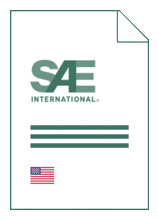Standards Worldwide
Standards Worldwide
Phone +49 30 58885700-07

Standard [CURRENT]
SAE MA 4872A:2012-11-09
Paint Stripping of Commercial Aircraft - Evaluation of Materials and Process
- Publication date
- 2012-11-09
- Original language
- English
- Pages
- 73
- Publication date
- 2012-11-09
- Original language
- English
- Pages
- 73
Product information on this site:
Quick delivery via download or delivery service
Buy securely with a credit card or pay upon receipt of invoice
All transactions are encrypted
Short description
This document has been declared "Stabilized" and will no longer be subjected to periodic reviews for currency. Users are responsible for verifying references and continued suitability or technical requirements. New technology may exist. This document details the technical requirements to be used in the evaluation of materials and processes developed for use in stripping organic finishes from fixed wing commercial aircraft. The requirements herein are intended to ensure that the materials and processes used are not detrimental to the commercial aircraft when used as specified. These requirements are not intended to judge performance of the stripping method. These requirements are intended to cover the use of both single and duplex processes involving mechanical, chemical, or thermal means, which include the following: 1) high pressure water blasting (with/without use of chemical paint softeners); 2) dry media blasting (e.g., wheat starch, plastic media blast (PMB), etc.); 3) wet media blasting (e.g., sodium bicarbonate); 4) ice-pellet blasting (e.g., CO2 or water, with/without use of chemical paint softeners); 5) chemical paint stripping (e.g., with/without a dedicated or strippable layer in the paint system); 6) thermal paint stripping (e.g., with/without the use of ice pellet stripping); and 7) other processes, may require different or additional requirements as determined necessary by the user and OEM. The requirements are based on the materials and finishes present on the aircraft at the time of delivery. If the materials, finishes or the processing are changed subsequent to delivery, the individual user may require that additional or different tests be included in any evaluation. The means of compliance with the requirements of this document will have to be negotiated between the user and the relevant regulatory authorities. The test methods defined in this document constitute a recommended means of compliance. The final responsibility for safety, health, environmental consequences, the selection of a process for stripping and the number of stripping cycles rests with the user. It is the responsibility of the user to verify that all testing has been accomplished to the requirements of this specification. This includes verification of laboratory capabilities. A formal instruction and training program for material and equipment operators, to include operator certification, shall be established and maintained by the user. These requirements are not intended to cover repair materials. The individual user shall incorporate process control procedures and inspection to ensure damage to repair materials has not occurred. Repair material guidelines are located in Annex K. Evaluation of strip processes may be performed on metallic and/or composite substrates for use on representative structure as defined by the user. Process limitations shall be well documented by the end user.
Loading recommended items...
Loading recommended items...
Loading recommended items...
